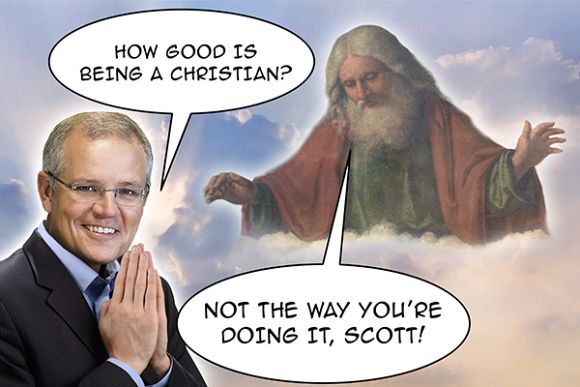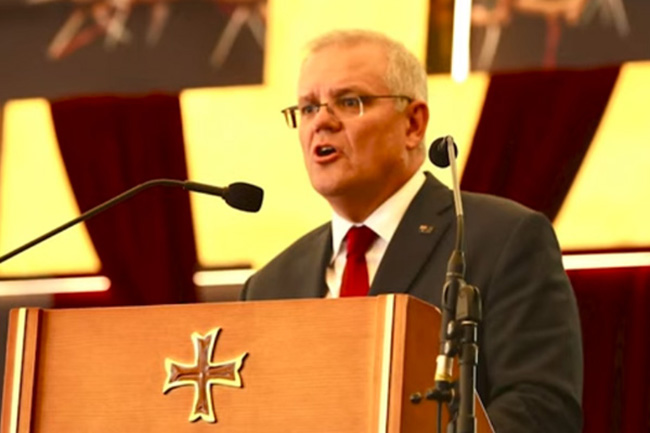Until Australia becomes a republic, our democracy still embraces archaic religious ideology with institutions that rely on taxpayers to survive, writes Max Wallace.
IN 2010, I defined a soft theocracy as:
‘...a state where church and government purposes coincide to garnishee taxpayers’ money and resources, structurally through tax exemptions, and functionally through grants and privileges.’
To explain this perspective, I argue here there are three dimensions to Australia’s Christian, monarchist, soft theocratic form of government: constitutional, symbolic and financial.
Constitutional
There are nine jurisdictions in Australia: Federal, two territories and six states. There are seven Constitutions: one Federal and six State. The British Queen, who is Supreme Governor of the Church of England, in England, is also Queen of Australia, so a religious figure symbolically sits atop the Commonwealth of Australia and atop the State jurisdictions.
The only section that mentions religion in the Federal Constitution is s.116. That section does not say there is a separation of church and state, or government and religion. Given that is so, it was up to the High Court to interpret s.116.
One could glean some subtle inferences that there is a separation from various cases, but there has never been an unequivocal statement to that effect. In fact, in Attorney-General (Vic) (ex Rel Black) v Commonwealth (Defence of Government Schools 1981 case), Sir Ronald Wilson said s.116 “cannot answer the description of a law which guarantees within Australia a separation of church and state”.
Sir Ninian Stephen said s.116 “cannot be viewed as the repository of some broad statement of the principle concerning church and state”. The Chief Justice, Sir Garfield Barwick, concurred.
Across the ditch, writing in the New Zealand Law Journal on 7 April 1959, Sir Ivor Richardson said something similar:
‘Although there is no established church, and although the various denominations rank equally in law, it does not follow there is a complete separation of church and state in New Zealand.’
Nothing has changed in the constitutional monarchy of New Zealand since then.
The point of s.116 could be said to merely deny the Commonwealth the ability to pass laws concerning religion, giving it a veneer of secularism. However, as we saw in the 1996 Andrews Bill concerning the Northern Territory’s Rights of the Terminally Ill Act, and the High Court Williams cases in 2012 and 2014, the Federal Government was able to do constitutional workarounds to quash the Territory law and fund religious-only chaplains in public schools. If there was a constitutional separation of government and religion in Australia, those manoeuvres, I suggest, would not be constitutional.
The Federal restriction on passing laws relating to religion does not apply to the states. There is no section in any State Constitution separating government and religion. The states still pass religious laws to do with churches’ trusts, incorporations and property matters and this has been the case since colonial times. The territories also pass this legislation.
There is a subculture of state legal bureaucracies corresponding with churches and other religious organisations, with specialist advice to governments on church legal matters, involved in this enterprise that goes sight unseen. This legislation is rarely, if ever, debated in parliaments or reported in the media except when a dispute over property between different branches of a church attracts attention.
A useful description of this legal phenomenon is the 2013 ‘Queensland Law Reform Commission Report, A Review of Religious and Certain Other Community Organisations’. This report, to review out-dated Acts, was chaired by a judge, four part-time Commission members including three QCs and one other lawyer. They had a supporting secretariat of seven. They recommended 14 Acts be repealed by the Queensland Government. These included Acts concerning All Saints Church, the Anglican Church, the Ann St Presbyterian Church, the Chinese Temple Society, the Queensland Congregational Union, the Roman Catholic Church and the Wesleyans. The Acts dated from 1830 until 1977.
As noted, much of this legislation concerns property matters. Colonial state governments simply gave parcels of lands to churches and legislated their rights to them.
On page 152 of the above Review, we read:
‘On 1 July 1863, the Queensland Government granted the land at the corner of Ann and Edward Streets, Brisbane, by deed of grant in trust, to the Trustees of the Total Abstinence Society.’
This was to erect a “temperance hall” that was built in 1869.
These land grants occurred in all states. They set up the churches to become the very wealthy organisations they are today. More recently, in 2008, the NSW Government gifted the Catholic Church an estimated $100 million for the church’s World Youth Day in Sydney. It could not be argued in a NSW court that this use of taxpayers’ money was unconstitutional. Furthermore, the Government would not answer questions in Parliament about the funding and stonewalled the Sydney Morning Herald’s FOI requests.
Symbolic
- The Australian flag features the British Union Jack with the three crosses of Christian Saints George, Andrew and Patrick;
- the state flags also have religious symbols;
- Christian prayers are said before the commencement of business in all jurisdictions except the A.C.T.;
- in the Senate, the President is compelled by Standing Order 50 to say a Protestant prayer;
- the Great Hall of the federal parliament has been used for prayer breakfasts;
- before the commencement of a newly elected government, there is a religious ceremony in a church where the prime minister and leader of the opposition read a lesson, usually a verse from the Bible;
- knighthoods, awarded by the Queen upon recommendation, have their origin in a religious ritual;
- in the High Court, when the full bench is sitting, the Usher declares “God save the Queen!” before the judges enter and sit;
- each year, the Catholic Church sponsors a “Red Mass” where scores of lawyers file into a cathedral to receive God’s blessing for the legal year ahead;
- important Christian days such as Christmas and Easter are celebrated as public holidays;
- ANZAC Day is to all intents and purposes a religious event with the anthem God Save the Queen often played at the Dawn Service;
- Australian postage stamps have Christian images on them every year; and
- we carry the image of the Supreme Governor of the Church of England, the Queen, in the loose change in our pockets.
Out of all this symbolism, the only secular thing is the Australian national anthem, Advance Australia Fair. Even there, it has been reported that private religious schools have added their own religious verses, against protocol but without sanction from the Government.
Financial
Religious organisations are income tax-exempt as they are legally charities that ‘advance religion’. They also usually do not pay land tax, capital gains tax, stamp duty, payroll tax, local government rates and many other smaller taxes. Ministers of religion pay income tax, but they can claim very generous fringe benefits which can have the effect of lowering their due income tax.
In a review paper on these matters, Alec Spencer asks:
‘Could it be the best tax haven is not the Mossack Fonseca office in Panama, but right here with our religious governance framework in Australia?’
This question squares with my 2007 definition of a church in The Purple Economy: a church is ‘an on-shore tax haven, subsidised by taxpayers to pursue the supernatural’.
In the James Cook University Law Review, (Vol. 22, 2016, revised 2019, p.84), Alec Spencer neatly summarised the cost of financial assistance to religion to Australia:
‘The combined annual cost to the nation is slightly more than our net national deficit, or aged pension scheme, or defence, or the Australian Public Service.’
There is so much politics unrelated to the relationships between government and religion that all of the above usually flies under the radar of political discourse in Australia, including in universities. It is, for the most part, sight unseen. Sure, churches have lost ground on issues like gay marriage, decriminalisation of abortion and voluntary euthanasia. But these social issues involve little taxpayers’ money.
To have any chance of changing our historical political-religious complex – our soft theocracy – Australia would have to become a republic with an amendment to the Constitution to separate government and religion. Only then would it be possible to argue, on grounds of separation of government and religion, that religious privileges of one kind or another are unconstitutional.
Until recently, that was the case in the Republic of the United States in respect of the big-ticket item of Federal funding of religious schools. In the 2019 case Espinoza v Montana Department of Revenue, the Trump appointees on the Supreme Court put a legal torpedo into the hitherto bipartisan support of the principle of separation of church and state, a principle on which the United States was partly founded. This demonstrates that even a republic is not safe from the churches who believe they have a right to impose their theocratic beliefs and they will do whatever it takes to get access to taxpayers’ money to promote them.
So, from a strictly secular perspective, Australia is not a secular democracy that favours neither religion nor atheism. It is a soft, Christian theocracy that has subsidised religion into the powerful position it has today where just five per cent or less of very religiously committed voters can frighten the more enlightened members of political parties into silence or sycophancy to continue their financial and other privileges.
As Anthony Albanese recently said of Labor Party social policy:
‘Ultimately, it boils down to a fair go for all. It is a sense of fairness that Jesus’ teaching radiates throughout the books of the New Testament and it informs the powerful and compelling tradition of Catholic social teaching.’
Max Wallace, PhD was the tutor in sociology and also occasionally politics at the Centre for Continuing Education at ANU from 1983 to 2003. He is now secretary of the Rationalist Association of NSW.
Related Articles
- Christian Lobby continues hate campaign against religious and gender freedom
- Religious communities failed the USA and are also failing Australia
- Hillsong claims Melbourne's iconic Festival Hall
- Proposed religious discrimination law hurts others in the community
- Religion should be separate from State, but apparently not in the 46th Parliament
 This work is licensed under a Creative Commons Attribution-NonCommercial-NoDerivs 3.0 Australia License
This work is licensed under a Creative Commons Attribution-NonCommercial-NoDerivs 3.0 Australia License
Support independent journalism Subscribe to IA.














